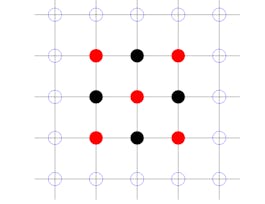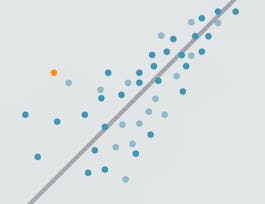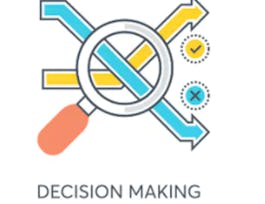This is the third and final course in the Linear Algebra Specialization that focuses on the theory and computations that arise from working with orthogonal vectors. This includes the study of orthogonal transformation, orthogonal bases, and orthogonal transformations. The course culminates in the theory of symmetric matrices, linking the algebraic properties with their corresponding geometric equivalences. These matrices arise more often in applications than any other class of matrices.

Neues Jahr. Große Ziele. Höhere Einsparungen. Schalte mit Coursera Plus für $199 ein Jahr unbegrenzten Zugang zum Lernen frei. Jetzt sparen.


Linear Algebra: Orthogonality and Diagonalization
Dieser Kurs ist Teil von Spezialisierung Linear Algebra from Elementary to Advanced

Dozent: Joseph W. Cutrone, PhD
TOP-LEHRKRAFT
1.660 bereits angemeldet
Bei  enthalten
enthalten
(30 Bewertungen)
Wichtige Details

Zu Ihrem LinkedIn-Profil hinzufügen
11 Aufgaben
Erfahren Sie, wie Mitarbeiter führender Unternehmen gefragte Kompetenzen erwerben.

Erweitern Sie Ihre Fachkenntnisse
- Lernen Sie neue Konzepte von Branchenexperten
- Gewinnen Sie ein Grundverständnis bestimmter Themen oder Tools
- Erwerben Sie berufsrelevante Kompetenzen durch praktische Projekte
- Erwerben Sie ein Berufszertifikat zur Vorlage


Erwerben Sie ein Karrierezertifikat.
Fügen Sie diese Qualifikation zur Ihrem LinkedIn-Profil oder Ihrem Lebenslauf hinzu.
Teilen Sie es in den sozialen Medien und in Ihrer Leistungsbeurteilung.

In diesem Kurs gibt es 4 Module
In this module, we define a new operation on vectors called the dot product. This operation is a function that returns a scalar related to the angle between the vectors, distance between vectors, and length of vectors. After working through the theory and examples, we hone in on both unit (length one) and orthogonal (perpendicular) vectors. These special vectors will be pivotal in our course as we start to define linear transformations and special matrices that use only these vectors.
Das ist alles enthalten
2 Videos2 Lektüren3 Aufgaben
In this module we will study the special type of transformation called the orthogonal projection. We have already seen the formula for the orthogonal projection onto a line so now we generalize the formula to the case of projection onto any subspace W. The formula will require basis vectors that are both orthogonal and normalize and we show, using the Gram-Schmidt Process, how to meet these requirements given any non-empty basis.
Das ist alles enthalten
3 Videos3 Lektüren4 Aufgaben
In this module we look to diagonalize symmetric matrices. The symmetry displayed in the matrix A turns out to force a beautiful relationship between the eigenspaces. The corresponding eigenspaces turn out to be mutually orthogonal. After normalizing, these orthogonal eigenvectors give a very special basis of R^n with extremely useful applications to data science, machine learning, and image processing. We introduce the notion of quadratic forms, special functions of degree two on vectors , which use symmetric matrices in their definition. Quadratic forms are then completely classified based on the properties of their eigenvalues.
Das ist alles enthalten
2 Videos2 Lektüren3 Aufgaben
Das ist alles enthalten
1 Aufgabe
Dozent

Empfohlen, wenn Sie sich für Machine Learning interessieren

The Hong Kong University of Science and Technology

Duke University

Johns Hopkins University

Howard University
Warum entscheiden sich Menschen für Coursera für ihre Karriere?




Bewertungen von Lernenden
30 Bewertungen
- 5 stars
93,33 %
- 4 stars
6,66 %
- 3 stars
0 %
- 2 stars
0 %
- 1 star
0 %
Zeigt 3 von 30 an
Geprüft am 4. Nov. 2024
It is great, the guy on the videos knows a lot, its a pity he writes so fast :))
Geprüft am 8. Dez. 2024
Teach good. It explore some of my blind areas about diagonalization, eigen and orthogonal, repeated roots concern, etc.

Neue Karrieremöglichkeiten mit Coursera Plus
Unbegrenzter Zugang zu 10,000+ Weltklasse-Kursen, praktischen Projekten und berufsqualifizierenden Zertifikatsprogrammen - alles in Ihrem Abonnement enthalten
Bringen Sie Ihre Karriere mit einem Online-Abschluss voran.
Erwerben Sie einen Abschluss von erstklassigen Universitäten – 100 % online
Schließen Sie sich mehr als 3.400 Unternehmen in aller Welt an, die sich für Coursera for Business entschieden haben.
Schulen Sie Ihre Mitarbeiter*innen, um sich in der digitalen Wirtschaft zu behaupten.
Häufig gestellte Fragen
Access to lectures and assignments depends on your type of enrollment. If you take a course in audit mode, you will be able to see most course materials for free. To access graded assignments and to earn a Certificate, you will need to purchase the Certificate experience, during or after your audit. If you don't see the audit option:
The course may not offer an audit option. You can try a Free Trial instead, or apply for Financial Aid.
The course may offer 'Full Course, No Certificate' instead. This option lets you see all course materials, submit required assessments, and get a final grade. This also means that you will not be able to purchase a Certificate experience.
When you enroll in the course, you get access to all of the courses in the Specialization, and you earn a certificate when you complete the work. Your electronic Certificate will be added to your Accomplishments page - from there, you can print your Certificate or add it to your LinkedIn profile. If you only want to read and view the course content, you can audit the course for free.
If you subscribed, you get a 7-day free trial during which you can cancel at no penalty. After that, we don’t give refunds, but you can cancel your subscription at any time. See our full refund policy.

